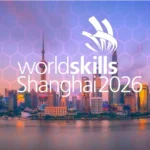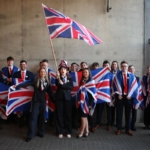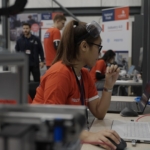I came to Kazan as an official observer in my role as Deputy Chair of WSUK. I was also a speaker at the global conference. I expected to once again be “blown away” by the personal and technical attributes of the members of ‘Team UK’! I also expected to experience an event which was bigger and better than previous events (and on this basis to have very sore feet!). I expected to experience a heightened level of international ambition and competitiveness and perhaps some tension.
On a personal basis, I learned much about the Russian culture including the remarkable levels of patriotism and authority structures. I was warmed by the charming hospitality and at times the overwhelming attention I received. On a competition basis it was good to gain an insight through the ‘Future Skills’ zone into new and progressive skill demands. It was sobering to recognise the increased levels of investment from some of the highest medal achieving nations – China, Russia, Brazil, etc. and to reflect on the relative levels of investment from the UK. This led to an ongoing dilemma for me on how we can continue to secure respectable levels of international medals and maintain a respectable level of performance in the league tables. My participation in the global conference has really challenged my thinking on how to prepare my teacher workforce for a future where technologies will be playing a greater role in knowledge transmission. It was good to share and receive views from international partners and recognise the strengths in other countries.
Learnings for the UK are that increased and sustainable levels of funding will impact positively on medal success. The decision must be… where should WSUK be supported to have most impact – securing medals or acting as a catalyst for change and improvement within the UK’s VET. In addition, there is much work to be done to embed the international standards of training and assessment into our system – where these are embedded the results speak for themselves. I think we also need to reflect on which skill areas to prioritise in relation to our post-Brexit economy.
Once again my greatest inspiration came from the behaviours and competencies of our competitors, including their support of one another and their personal maturity often in the face of exceptional stress. They are truly amazing young people. What moved me most was the reaction of family members, parents, partners and grandparents to all competitors. I was surprised once again by the sheer talent and potential of the competitors and the secure knowledge that this potential is within the majority of youngsters with whom we work in FE. It just needs nurturing, inspiring, recognising and celebrating!


